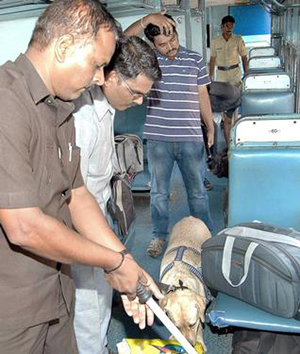Belgavi, May 12: A hoax call on Wednesday created panic among passengers on the Mysore-Ajmer Express train and kept them under an invisible threat for nearly three hours in the afternoon at the Desur Railway Station about 11 km from Belagavi on the Londa-Miraj section of the South Western Railways.
The passengers and the Railway officials heaved a sigh of relief after it was found that there was no bomb or any explosive on board as reportedly claimed by the caller. The panic button was pressed when the call came to the Control Room of Railway Protection Force (RPF) at Pune, claiming that there was a bomb on the train. The RPF officials immediately informed the authorities concerned and Station Masters en route Mysuru-Sangli, when the train had just passed Khanapur of Belagavi taluk. The train was stopped at Desur, even as a bomb disposal squad with two sniffer dog squads and personnel from the RPF and senior officials from South Western Railways, Hubballi division, rushed to the station and conducted a thorough search for nearly three hours.
The passengers, who were caught unawares when RPF personnel started checking baggage and their other belongings, came out of their coaches in panic when the personnel told them that they were looking for a bomb. Some of the passengers jumped out of their coaches in a hurry, while others helped aged relatives and co-passengers to alight and move to safety. With the call eventually turning out to be a hoax, the train left for its onward journey around 5 p.m. The train was already running three hours behind schedule. Even as the officials were preparing for the departure of the train, a RPF personnel found a wooden box containing a few dummy hand grenades belonging to Venu M.R., a Subedar, who was travelling with two of his colleagues from the Indian Army’s 1890 Rocket Regiment in Rajasthan.
South Western Railways Divisional Security Commissioner V.S. Mallikarjuna said that the Army personnel were allowed to continue their journey after verification from their unit.





Comments
Add new comment